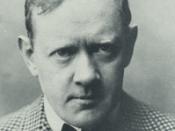In this paper I intend to explain what the Divine Command Theory means according to Emil Brunner and how Kai Nielsen objects to that theory. I plan to do this by an explanation of what Divine Command Theory is as opposed to Humanistic Ethics. I plan to show that abandoning religious ethics in support of Humanistic Ethics is not reasonable.
What is Divine Command Theory? According to Emil Brunner "Genuine humanly good is found only in the unconditional, unquestioned obedience of man to God." That this is a power from God. According to Ms. Rodrigues' explanation "morality is determined entirely by God's command." I believe that it means that the only way to be a goodly and moral person is by following God's commands. That obeying human laws or human moral codes does not make you a "good person." Nevertheless, when we follow God's commands, we become people of genuine human goodness.
Mr. Brunner believes that good is done for the sake of God and that we do good to please God because this is what God commands. He believes that God is in total control of our happiness and God's plan for our happiness is found in sanctions, rewards and punishments. These sanctions are the make-up of our moral code. God knows all and has a plan. We, as humans, may not know what that total plan is. If we follow the Divine Command Theory, it would not matter because the moral code dictates that we follow God's command. We are to do as God commands us and we will then be genuinely good humans. We will be good if we follow Gods commands.
According to Kai Nielsen, a person who follows the ethics of a Humanist we would believe the following; that things could be...


